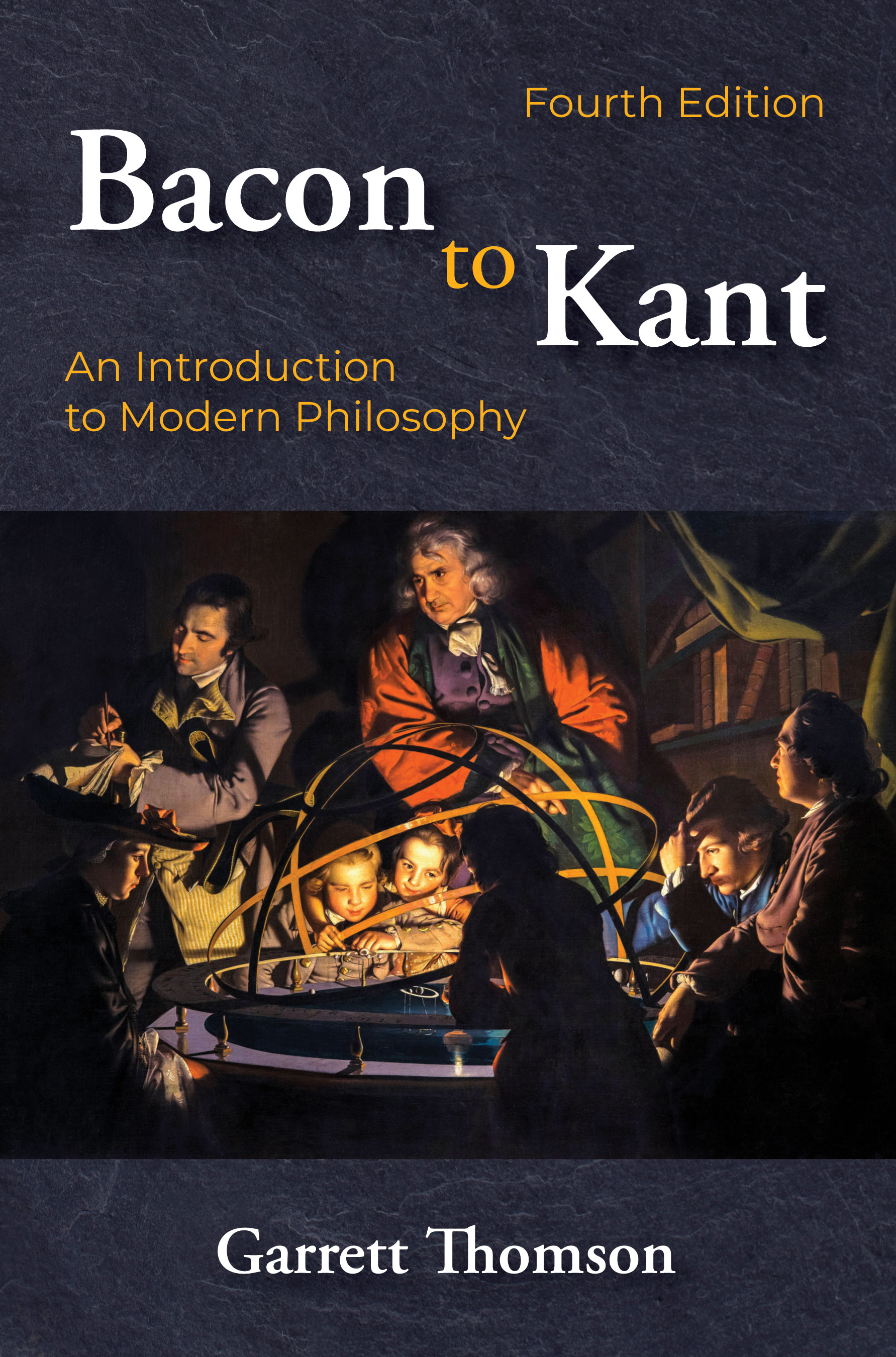"It's incredibly clear and helps my undergraduate students make sense of the difficult primary source readings of this time period. I will continue using this text as long as I teach this course." —Amy MacArthur, High Point University
“This is exactly what an overview should be. Excellent!” — Robert Vitt, Long Beach City College
“I have used this text for many years with a great deal of success. Thomson does an excellent job of explaining difficult material in a way my students can understand.” — Barry Brown, Missouri Southern State University
“It provides students with a roadmap through the difficult terrain of the seventeenth-century philosophical writing.” — Carol Collier, University of Sudbury

388 pages, $48.95 list
1-4786-4898-8
978-1-4786-4898-7
© 2023
paperback
eBook availability
Also by
Garrett Thomson
Garrett Thomson
Bacon to Kant
An Introduction to Modern Philosophy
Fourth Edition
In teaching Modern philosophy, the absence of a comprehensive secondary text results in much class time spent on clarifying the ideas of the philosophers, leaving little room for philosophical discussion of wider issues. Bacon to Kant was developed as a response to the classroom need to offer undergraduate philosophy students an introduction to the claims and arguments of ten of the most-studied Rationalist, Empiricist, and Enlightenment-era philosophers—Descartes, Spinoza, Leibniz, Bacon, Hobbes, Locke, Berkeley, Hume, Rousseau, and Kant. The text is designed to be accessible without being philosophically naive. Thomson explains and analyzes central arguments in a readable and engaging style. Critical assessments of evolving views and arguments, contrasting interpretations of original texts, and thought-provoking questions designed to promote lively discussion help students connect the material to broader contemporary philosophical issues.
Reactions
Introduction
Part One: THE RATIONALISTS
1. Descartes: The Method of Doubt and the Cogito
2. Descartes: God
3. Descartes: Mind and Body
4. Spinoza: God and Substance
5. Spinoza: The Nature of the Mind
6. Spinoza: Theory of Knowledge
7. Leibniz: Truth and Reason
8. Leibniz: Against Material Substance
9. Leibniz: Monads and God
Part Two: THE EMPIRICISTS
10. Bacon: The Philosophy of Science
11. Hobbes: Science and Nature
12. Hobbes: From Psychology to Politics
13. Locke: Ideas and Qualities
14. Locke: The Formation of Complex Ideas
15. Locke: Language and Knowledge
16. Locke: Morality and Politics
17. Berkeley: The Denial of Matter
18. Berkeley: God and Minds
19. Hume: Ideas and Impressions
20. Hume: Causation
21. Hume: Material Bodies and Identity
22. Hume: Morality and Passion
Part Three: ENLIGHTENMENT THINKERS: Rousseau and Kant
23. Rousseau: The Social Contract
24. Kant: The Transcendental Aesthetic
25. Kant: The Analytic of Concepts
26. Kant: The Analytic of Principles
27. Kant: The Transcendental Dialectic
28. Kant: Morality
Glossary
Part One: THE RATIONALISTS
1. Descartes: The Method of Doubt and the Cogito
2. Descartes: God
3. Descartes: Mind and Body
4. Spinoza: God and Substance
5. Spinoza: The Nature of the Mind
6. Spinoza: Theory of Knowledge
7. Leibniz: Truth and Reason
8. Leibniz: Against Material Substance
9. Leibniz: Monads and God
Part Two: THE EMPIRICISTS
10. Bacon: The Philosophy of Science
11. Hobbes: Science and Nature
12. Hobbes: From Psychology to Politics
13. Locke: Ideas and Qualities
14. Locke: The Formation of Complex Ideas
15. Locke: Language and Knowledge
16. Locke: Morality and Politics
17. Berkeley: The Denial of Matter
18. Berkeley: God and Minds
19. Hume: Ideas and Impressions
20. Hume: Causation
21. Hume: Material Bodies and Identity
22. Hume: Morality and Passion
Part Three: ENLIGHTENMENT THINKERS: Rousseau and Kant
23. Rousseau: The Social Contract
24. Kant: The Transcendental Aesthetic
25. Kant: The Analytic of Concepts
26. Kant: The Analytic of Principles
27. Kant: The Transcendental Dialectic
28. Kant: Morality
Glossary